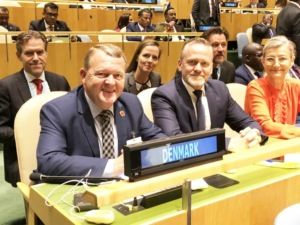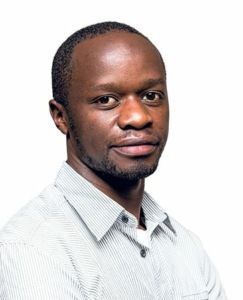Opinion
Straight Up: ‘Our Man’ at the UN General Assembly
Zach Khadudu
This article is more than 7 years old.

The team were in place in New York … if only international concerns were as pressing at home (photo: Ulla Tørnæs)
The 73rd session of the UN General Assembly took part last week in New York City.
Themed ‘Making the United Nations Relevant to all People: Global Leadership and Shared Responsibilities for Peaceful, Equitable and Sustainable Societies’, the assembly was part strategy, part self-aggrandisement – particularly as far as the big powers were concerned.
While Trump seized the moment to remind everyone of his ‘bigly’ accomplishments – which are “more than almost any administration in the history of our country” – our European comrade Emmanuel Macron was in no mood to take prisoners. He fired back at the Trumpian doctrine of nationalism, calling for multilateralism – especially in diplomacy and trade.
Seen to care for next-gen
While plenary duels stole the headlines, sideline events were largely underreported, like the youth agenda panel for instance, which our main man Lars Løkke Rasmussen attended.
Titled ‘Working for and with Young People’, the panel praised Løkke for Denmark’s support of the UN youth agenda. Fair game; Denmark can be found at the forefront supporting several UN undertakings – particularly youth-related ones. Asked why Denmark commits to youth engagement, the premier quipped: “It is not very difficult to answer that question, as it is about the future, and right now we have the biggest youth generation in the history of the world.” Easy.
Blowing his own trumpet, he further reminded all and sundry of the Sustainable Development Goals (SDGs) adopted at the UN summit in 2015 that he chaired. He noted that the SDGs were basically a “contract between generations, between regions and between genders … and there is no way we can achieve the SDGs unless we engage the next generation”. Pause right there, Mr Prime Minister.
Denmark first, unis last
While internationally Denmark may be seen as a champion of youth, globalisation and multilateralism, affairs back home are not necessarily on par. Just this August the education minister announced a significant cut to English language programs at Danish universities. It is a no-brainer that this will greatly impact Denmark’s attraction of international talent and competitiveness.
In the case of the University of Copenhagen, its rector Henrik C Wegener noted that “the University of Copenhagen is already working on getting more international students to find jobs in Danish companies. But the university’s English-language programs are part and parcel of being an international university with international top researchers who can research and teach for the benefit of Danish students.”
Cut universities’ international engagement, and the loss is ours.
Blame it on Bogeyman
While Trump is the undisputed king of isolationism, Løkke’s gospel according to ‘Denmark First’ is not far off, whether it is education cuts, toughened refugee policies, inhibiting family reunification laws or rigid Danish citizenship statutes. Clearly, Donald Trump, Victor Oban and their ilk have admirers.
And if anything goes wrong, make sure you’ve got a scapegoat ready. Danske Bank’s money-laundering scandal, which has been described by the European Commission as “the biggest financial scandal in Europe” right now, has led to the resignation of its chief executive Thomas Borgen.
And he just happens to be a Norwegian. While Borgen is not personally implicated, the buck stopped at his desk. Another scandal, another foreigner. Bro! We messed up again! These foreigners!

About
Zach Khadudu
Zach Khadudu is a Kenyan by birth and a journalist by choice. He is a commentator and an activist with a passion for refugee and human rights. He may share a heritage with a certain US president, but his heart lies elsewhere – in the written and spoken word.










































